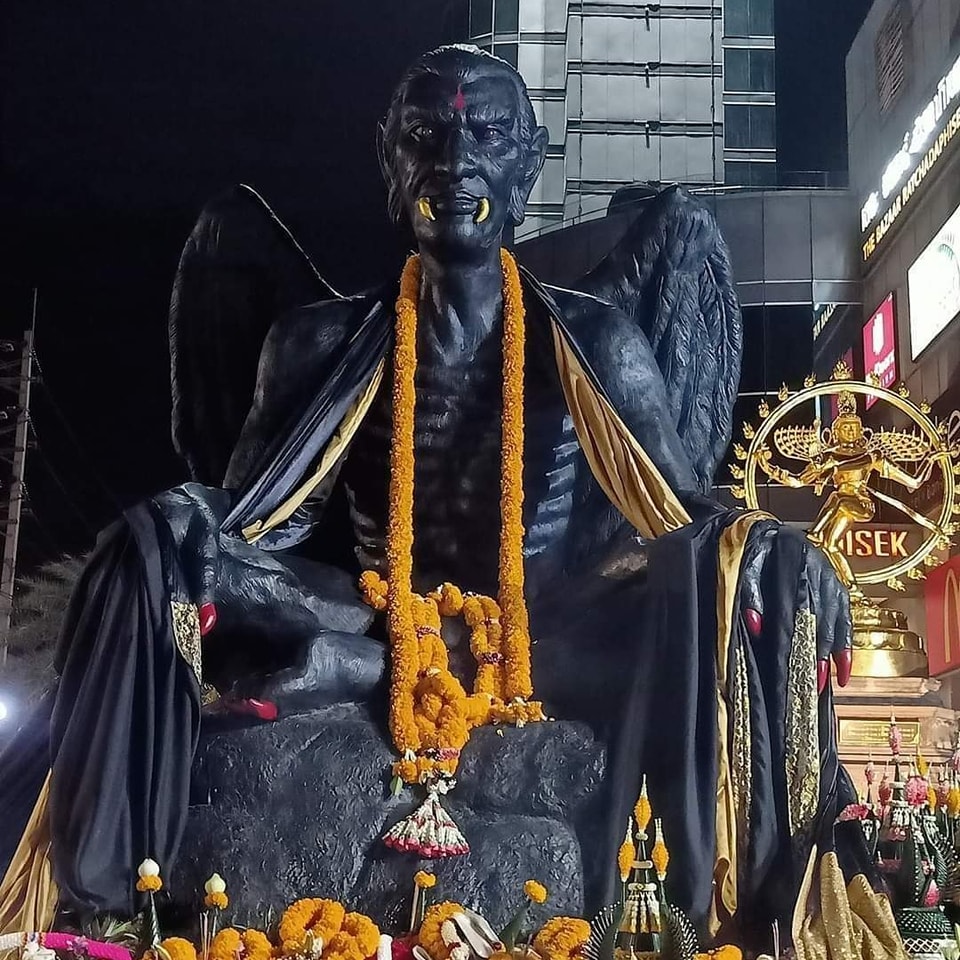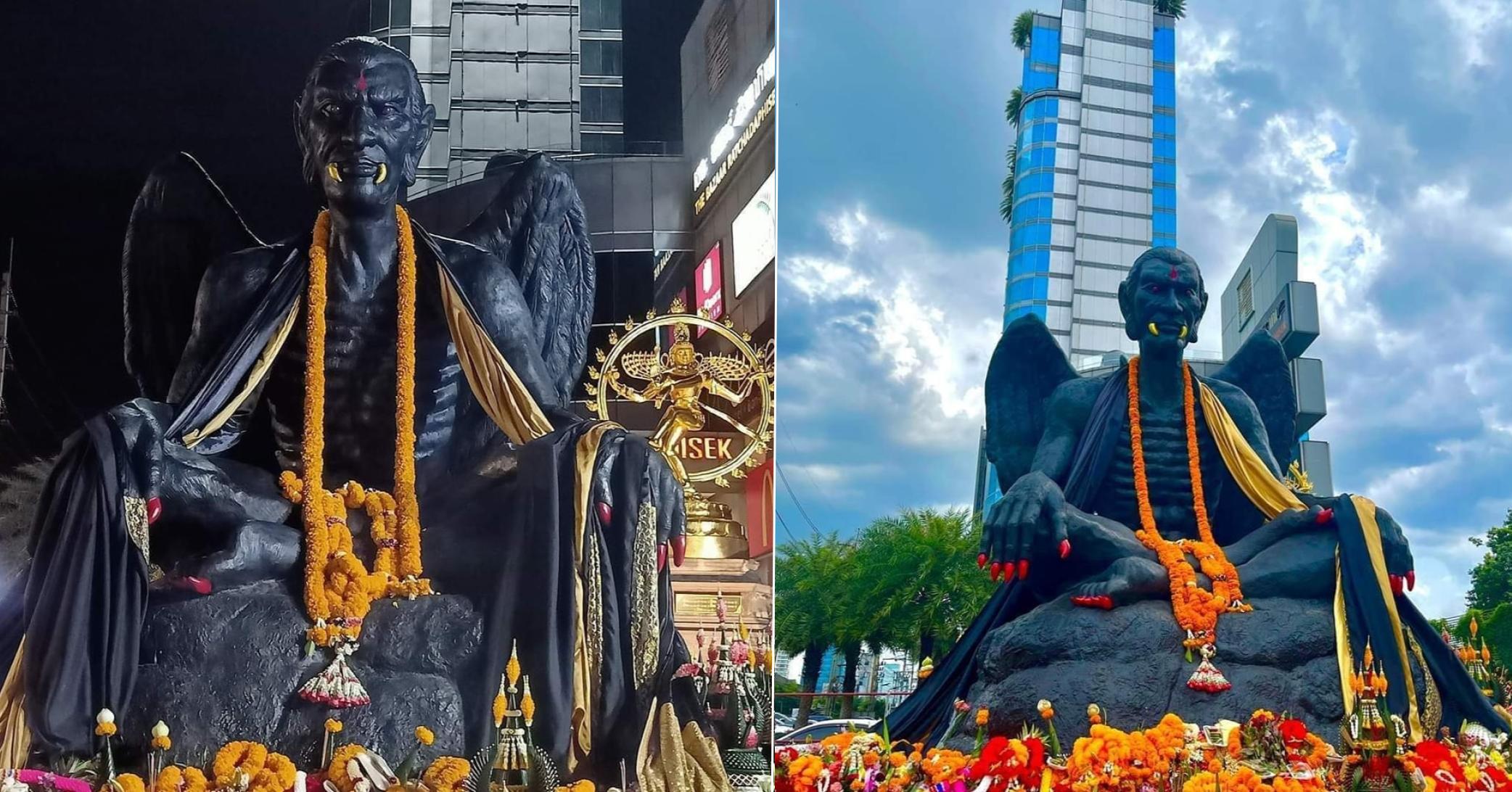A 4m-tall gargoyle-like statue erected in front of the Bazaar Hotel on Ratchadaphisek Road in Bangkok, Thailand has set tongues wagging in the Buddhist-majority country.
The Khru Kai Kaeo statue looks half-human and half-bird with red eyes, gold fangs, and red talons.
 Image via 泰国佛牌收藏家小李/Facebook.
Image via 泰国佛牌收藏家小李/Facebook.
A group of Buddhist artists, accredited by the country's Religious Affairs Department, urged the Bazaar Hotel to take down the statue, saying that the artefact's unsettling appearance disturbed passersby, Bangkok Post reported.
The group which identified itself as the "Council of Artists Promoting Buddhism" claimed that the Khru Kai Kaeo statue promotes "devil worship".
The statue was put up on Aug. 9 and inaugurated on Aug. 13.
"Ominous" and "scary"
The controversial statue first made headlines for causing a traffic jam when it was unable to pass through an underpass as it was too tall.
Since then, the Khru Kai Kaeo statue has gained traction for being "ominous" and "scary", with some claiming that it "represents black magic and a force for evil worshippers [who] believe it could make them rich", Khaosod English reported.(1/2) BREAKING: Sources say the Council of Artists for the Promotion of Buddhism will on Fri submit a petition to Night Bazaar Hotel proprietor to have the controversial statue of Guru Kai Kaew removed from its open-air site aft many warn it's an ominous & scary statue. #Thailand pic.twitter.com/JqQCeZ0jCI
— Khaosod English (@KhaosodEnglish) August 17, 2023
Sacrificial offerings
Subsequently, devotees of Khru Kai Kaeo reportedly posted on social media asking for puppies, kittens, and rabbits, supposedly to be used as sacrificial offerings for the deity in exchange for monetary gains.
This put the methods of worship under scrutiny.
The Watchdog Thailand Foundation said they will be investigating the issues, asking the public to submit any evidence or leads to the group."Nothing sacrificial"
A disciple of a master who is defending the Khru Kai Kaeo statue insisted that the speculation about animal sacrifice were "definitely not true".
"The real practice of worshipping this deity is to use honey, sweet Thai desserts, flowers, and even perfume. Nothing sacrificial," the disciple said in an interview with content creator Uptin.
Uptin further posed questions in his video while investigating the Khru Kai Kaeo statue: "Is it religion? Is it art? Or is it a marketing scam?"
According to Uptin, the hotel was not doing well until the statue was erected on its premises— with hotel bookings increasing by up to 90 per cent until the end of 2023.
"People can always believe what they say, what they think. I have no comments about this," the disciple said when asked about his thoughts on the hotel's booming business.
"This has nothing to do with Buddhism," the disciple added.
"If you understand truly what the culture is, there are a lot of different kinds of deities in the Thai culture. So this is one of the deities that people worship."
According to the disciple, the area around the Khru Kai Kaeo statue is being constructed into a shrine at the moment.
Khru Kai Kaeo
There are varying accounts of Khru Kai Kaeo's origin, with some historians claiming that they had never heard of this deity before.
According to one account, Khru Kai Kaeo is said to be the esteemed mentor teacher of Jayavarman VII, a former king of the Khmer Empire, Bangkok Post reported.
According to another account by an amulet maker selling religious accessories related to Khru Kai Kaeo, the first statue of the deity was created by a monk from Lampang Province in the north of Thailand.
The deity is believed to be the "god of wealth" and would fulfil its devotees' wishes, especially in areas of business and monetary dividends.
However, renowned historian Thepmontri Limpaphayom told Thailand's public broadcasting service Thai PBS that Khru Kai Kaeo is actually a replica of gargoyles that decorated the gutters of castles and ancient churches in Europe.Limpaphayom maintained that the deity had nothing to do with an ancient Khmer king and wondered why many people would not discover the truth about the sculpture first before worshipping it blindly.
Faith-based tourism
Thailand's government encouraged its citizens and tourists to be discerning before worshipping any deity, encouraging them to be cautious before engaging in any faith-based tourism as people flocked to the Khru Kai Kaeo sculpture after it was installed, Bloomberg reported.
“Concerning any trends on social media, people should consider the history and the beautiful Thai culture of not encroaching on other lives,” Traisuree Taisaranakul, deputy government spokesperson, said in a statement on Aug. 17.
“If you believe in something, believe with mindfulness and do not become obsessed and fall prey to people with bad intentions.”
According to the Bangkok Post, the hotel has agreed to put a dome to cover the statue, shielding it from members of the public who may be unsettled by its appearance.
A court hearing on the petition to remove the statue has been set for Sep. 12 at 10am.
Top image via 泰国佛牌收藏家小李/Facebook.
If you like what you read, follow us on Facebook, Instagram, Twitter and Telegram to get the latest updates.



